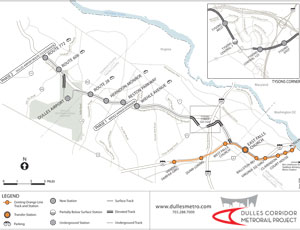A planned rail transit spur in northern Virginia has moved another step forward, with U.S. Transportation Secretary Mary E. Peters' approval of a $900-million, multi-year federal funding commitment towards the project's $2.6-billion first phase. With Peters' Jan. 7 action, the proposed "full funding grant agreement" goes to Congress for a 60-day review.
The $900 million would help finance an 11.6-mile first stage of a planned 23-mile extension of of the Washington Metropolitan Area Transit Authority's Orange Line. Phase One would branch off from Metro's existing Orange Line and run to Wiehle Avenue. It would have five stations, including four in the Tysons Corner commercial area near the Capital Beltway.
An 11.5-mile, six-station second phase would include a stop at Dulles International Airport.
The project is being managed by the Metropolitan Washington Area Airports Authority, which runs Dulles and Ronald Reagan National airports. The authority has awarded a $1.6-billion design-build contract for phase one to a team of Bechtel Infrastructure Corp. and URS Corp.'s Washington division.
Just a year ago, the plan was in danger. In January 2008, then-Federal Transit Administration chief James Simpson had said that because of the estimated cost and other factors, FTA said that the agency's rating for the plan "would render it ineligible to advance to final design."
Virginia Gov. Tim Kaine (D), the airports authority and other officials then trimmed the phase-one cost by 9% and made other changes. Prospects grew brighter. FTA said the project could advance to final design and released $159 million. On Dec. 3, FTA Acting Administrator Sherry E. Little signed off on the $900- million grant agreement.
After Peters gave her approval, she said in a statement: "Through a collaborative effort between local, state, and federal governments and the private sector, I think the project is now stronger, more financially sound and a better deal for commuters and taxpayers."





Post a comment to this article
Report Abusive Comment